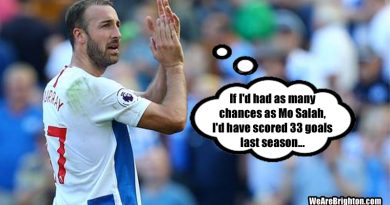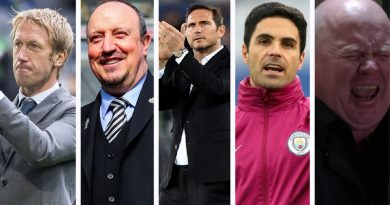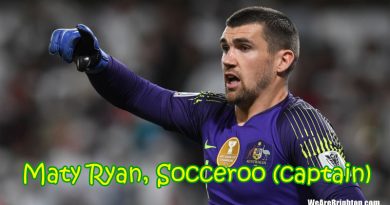Does it matter if Fabian Hurzeler was not first choice for Brighton?
Panic on the streets of Hove (actually). Or something like that. Ahead of the impending arrival of Fabian Hurzeler as new Brighton head coach, some Albion supporters have expressed concern over him not being the club’s first choice to replace Roberto De Zerbi.
WAB is here to alleviate the worries. Because it really doesn’t matter. Just ask Russell Slade. Or maybe even De Zerbi.
Yes, despite the public pronunciation from Paul Barber to BBC Five Live breakfast when De Zerbi was appointed that the fiery Italian had been the Albion’s “only choice”, we have it on good authority from several different sources that an out-of-work Mauricio Pochettino was pursued by Brighton.
De Zerbi got the gig, however, and the rest is history. A top six finish, Europa League football and a short yet glorious spell where the Albion were genuinely one of the best teams on the planet.
The number one choice card has always fascinated me. No club chairman or chief executive is going to come out and say when announcing their new head coach: “This bastard was actually our seventh choice for the role, but the other six turned us down. We kind of wish we hadn’t got rid of the old guy now.”
De Zerbi might well have been first choice. But the talks with Pochettino show De Zerbi was not the only choice. Unnecessary spin at its best in an attempt to elevate the club’s succession planning and processes.
The same spin will surely not be rolled out when it comes to Hursteler. The whole world knows Brighton’s number one target was Ipswich Town boss Kieran McKenna.
McKenna was the one whom the data and algorithms which underpin everything the Albion do pointed towards. On Bloom’s famous manager succession planning list, his name was top.
Andy Naylor confirmed as much for The Athletic. With most of his stories fed to him direct from the club, we can be certain of its truth.
But data, algorithms and lists only take you so far. They cannot take into consideration whether the best candidate will want the job. Or if other clubs will also be interested.
At the point Brighton parted ways with De Zerbi, they may have been reasonably confident of landing McKenna. But it did not take long for the waters to muddy.
Our good friends from Stamford Bridge suddenly found themselves on the lookout for a new manager. Chelsea are yet to have an original idea of their own since Todd Boehly arrived last summer and so presumably considered McKenna for no other reason than he was on Brighton’s shortlist.
Then there was the neverending speculation that Manchester United might sack Erik ten Haag. As a lifelong United fan and former coach at Old Trafford, that particular job would hold way more appeal for McKenna than Brighton.
In the end, Chelsea did miraculously instead chart their own path for Leicester manager Enzo Maresca. United meanwhile appear to be sticking with Ten Haag despite considering and even talking to other options.
With Ipswich responding to all the interest by offering McKenna a new contract to become one of the highest paid head coaches in the Premier League, he decided to remain at Portman Road.
Money obviously talks, but it was still nice to see a rare example of loyalty in the 21st century Premier League. Good luck to him and The Tractor Boys this season, other than when they face the Albion.
McKenna is not the first ever manager Brighton wanted to turn the Seagulls down. He will not be the last either.
The success Bloom had in successfully and straightforwardly landing De Zerbi to replace Graham Potter and Potter to take over from Chris Hughton seems to have raised expectations to that being how smoothly all managerial changes go.
They don’t. Which is why Bloom’s ever-updating list is so important. You need a second, third, fourth, fifth, sixth choice to avoid the exact scenario of putting all your eggs in one basket and finding them smashed.
In terms of age and managerial style, McKenna and Hurzel are remarkably similar. When Brighton were unable to land their first choice, they were instead ready to move onto another head coach with the same profile.
This might seem entirely logical. But the number of other football clubs who appoint managers vastly different in approach and skillset to their previous boss and the players they have is astounding
Just look at Crystal Palace. They went from trying to play possession based, attacking football for 18 months under Patrick Vieira to giving defensive-minded, attritional, Roy Hodgson another crack at the job in his 70s.
The difference Oliver Glasner has made in only five months since replacing Hodgson shows you what a waste the former England manager’s return was.
With no succession planning from Vieira to Hodgson, Palace effectively lost a year on dull football which drove a wedge between supporters and club.
And now, as promised, comes a reference to the great Russell Slade. When Dick Knight began the search for a successor to Micky Adams in February 2009, a man who had recently left Yeovil Town was not high on the shortlist.
Indeed, the job seemed certain to go to Stockport County boss Jim Gannon after Knight also considered Aidy Bothroyd and Paul Ince.
Compensation was agreed with the Hatters, Gannon travelled down to Brighton to meet Knight and a contract thrashed out. But then 24 hours later, Gannon said no and remained at Edgeley Park.
Knight was no stranger to such scenarios. In 2002, he waited until mid-July and the World Cup finishing in an attempt to appoint Cameroon manager Winfried Schafer to succeed Peter Taylor.
When Schafer pulled out at the last minute, Knight instead gave the job to director of youth Martin Hinshelwood. It was a panicked appointment with the club’s first season back in the second tier for a decade just three weeks away from kicking off.
With Gannon rejecting the gig, Knight instead turned to Slade. Fourth choice behind Gannon, Bothroyd and Ince at best. It felt at the time like another move made out of desperation, akin to Hinshelwood.
Over two weeks had elapsed since Adams was fired, in which time caretaker manager and former TV salesman Dean White had overseen such cracking results as a 4-0 home defeat to Crewe Alexandra.
Knight needed someone in – anyone in – before the Albion were pulled too far into the League One relegation battle. Slade though did not turn out to be just anyone.
He ended up masterminding one of the greatest escape from relegation in Brighton history, keeping the club out of League Two despite being eight points adrift of safety with seven games to go.
Had Slade not kept Brighton up and the Albion began the 2009-10 season in the bottom division of English football, the last 15 years of Seagulls history might well look very different.
Fast forward to 2024 and it does not matter whether Hurzeler was second choice after McKenna, fourth choice like Slade or 202nd choice after Sami Hyypia, H from Steps and the Ghost of Margaret Thatcher.
What matters is his managerial talents and whether he is the right man to succeed at Brighton. Based on what he is done at St Pauli, Hurzeler ticks a lot of boxes.
He has coped uncomplainingly with his best players being sold. Punched above his weight in terms of money-to-league performance, winning the Bundesliga 2 title with an upper mid table budget just 18 months after taking over when St Pauli were in relegation trouble.
He turned players previously considered journeyman or promising youngsters who never reached their potential into champions. He has proven he can get the best out of the individuals at his disposal.
Hurzeler’s style of play is similar to De Zerbi, meaning it should be suited to this Albion squad. His youthfulness allows him to understand and empathise with young players, of which Brighton have plenty.
And he forged a strong, almost instant connection with the Millerntor faithful. Something which De Zerbi’s replacement is going to need, given the force of personality the Italian was and the popularity he maintains with a majority of Seagulls supporters.
Hurzeler might not have been Brighton’s first choice. But he is still Bloom’s choice. Bloom who has made only one managerial misstep – Hyypia – in 15 years as Albion chairman so far.
That is good enough for me.




